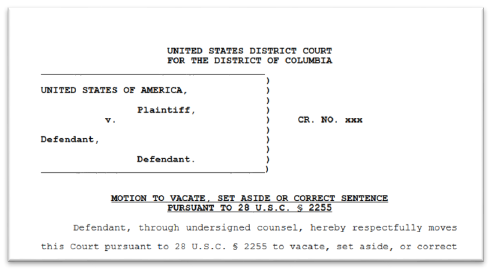Argument preview: Complex retroactivity questions arising from Justice Scalia’s void-for-vagueness decision last Term

on Mar 23, 2016 at 8:11 am
It seems increasingly clear that the current Supreme Court Term will have to be headlined “Justice Scalia is sorely missed.” Next Wednesday, March 30, the Court will hear argument in yet another criminal case in which the unexpected passing of Antonin Scalia on February 13 will leave an unanswered “hole” in the Court’s deliberations. Last June, Justice Scalia wrote the opinion in Johnson v. United States, in which, after an eight-year campaign originating in Justice Scalia dissents, a majority declared the “residual clause” of a federal repeat-offender statute unconstitutionally vague. The question quickly arose whether that ruling should be applied to federal cases on collateral review, even though they were “final” before Johnson was decided. That is, should Johnson apply “retroactively”? To answer that question, the Court chose (from among others) the petition in Welch v. United States. (On a tangential note, some courts of appeals have differed on the question of retroactivity for “initial” versus “successive” collateral review requests; this case will apparently answer for both contexts.)
Interestingly, the federal government has told the Court that it agrees with Gregory Welch that Johnson should be fully retroactive, and that Welch’s case should be remanded for resentencing. Thus, the Court has appointed an experienced amicus, Helgi Walker (a former clerk to Justice Clarence Thomas and partner at Gibson Dunn), to defend the judgment below, and the amicus brief, while likely controversial, is excellent.
A large potential impact
If Johnson applies retroactively to cases on collateral review, the impact on hundreds or even thousands of federal sentences could be large, and the administrative burden of resentencings significant. Under the Armed Career Criminal Act (“ACCA”), if a federal unlawful-gun-possession defendant has three prior “violent felony” convictions, his sentence is increased from a possible ten-year maximum to a mandatory minimum of fifteen years to life in prison. In Johnson, a majority declared unconstitutional, as too vague, a “catch all” part of the definition of violent felony, called the “residual clause.” Justice Scalia’s opinion was quite scathing in critiquing the statutory language, while the dissenters felt it extended the due-process concept of unconstitutional vagueness too far.
Nevertheless, if Johnson applies retroactively, any defendant who has been sentenced to a lengthy federal term as a “fourtime loser,” with one of his three prior convictions found to be “violent” only under the residual clause, could demand resentencing and a substantial reduction of his sentence – or even immediate release. Defending the judgment below, Walker says there are “hundreds and possibly thousands” of such offenders, and that the “early release” of such offenders would be a “dangerous windfall that . . . Congress . . . did not intend.” Moreover, some lower courts have also applied Johnson to find unconstitutional a similarly worded provision of the federal Sentencing Guidelines, and Walker says some 16,000 federal offenders could be affected under a retroactive application. (The federal government says that the Sentencing Guidelines, unlike an unconstitutional statute, are not subject to retroactive reconsideration.)
Brief facts; more detail seems unnecessary
In 2010, Welch pled guilty to federal charges of being a “felon in possession” – that is, possessing a firearm while having at least one prior felony conviction. But because Welch had not one but many prior felony convictions, the government sought an enhanced sentence under the ACCA. At sentencing, Welch argued (among other things) that one of his prior Florida robbery convictions ought not to “count” because it did not fall within the categorical definition of the ACCA’s residual clause. But the district court disagreed and sentenced Welch to the enhanced minimum fifteen years in prison; the Eleventh Circuit affirmed.
After the Supreme Court denied certiorari in his direct appeal, Welch filed a collateral federal petition challenging his conviction. The district court denied that petition and declined to issue a Certificate of Appealability (“COA”). However, three weeks after the Eleventh Circuit also denied a COA, the Supreme Court issued its surprising decision in Johnson. Welch filed a pro se – that is, by himself, without an attorney – petition for certiorari from prison on a sketchy typewritten form (shades of Gideon v. Wainwright!), and the United States waived its right to respond to the petition. But after the Court requested a response from the government (at which point lawyers from Jenner & Block signed on to represent Welch), certiorari was granted.
More details about the facts of Welch’s case and offenses seem largely irrelevant, because however the Court rules on the retroactivity question, either the judgment below will simply be affirmed, or a remand will be necessary to resentence Welch without his contested prior offense or (as the federal government suggests) to determine whether that prior offense should still be “counted” under a different section of the ACCA.
The complex doctrine of “retroactivity”
The law of retroactivity has a troubled history in the Supreme Court, largely because it is so intellectually confounding. But also, retroactivity allows long-convicted offenders to seek relief (thus denying the government and crime victims “finality”), while non-retroactivity efficiently ends litigation (and, critics would say, leaves them in prison serving unconstitutional sentences). No matter how you (or I) write it, there is an ideological or “political” tinge to the retroactivity debate.
As the Warren Court developed (some would say “discovered”) new constitutional rights in the 1960s, the Justices struggled with who should get the benefit of those new rights, as opposed to leaving convictions and sentences that were already “final” in place. In 1971, Justice John Marshall Harlan II famously proposed (concurring and dissenting in part in Mackey v. United States) what has become the current rule: “new rules of constitutional procedure” apply to all cases that are not yet final when the decision is issued, but cases that are final cannot claim the benefit of such a “new rule” on collateral review. “Final” means that the defendant’s direct appeals have all failed and the Supreme Court has either finally decided or denied cert. in the case, or the time to file for certiorari on direct appeal has expired.
Eighteen years after Mackey, the Court in 1989 again famously (critics would say infamously) adopted Justice Harlan’s suggestions, in Teague v. Lane. All cases still on direct appeal get the benefit of new constitutional rulings, but not cases on habeas. That is, “generally,” new constitutional rules “should not be applied retroactively . . . on collateral review.” But the Court also noted two “exceptions” from Justice Harlan’s opinions: “substantive” rules, as well as “watershed” procedural rules, are exempt from Teague’s bar to retroactive application.
Despite its announcement twenty-seven years ago, the application of Teague’s retroactivity doctrine has continued to trouble the Court. Most recently, the Court split six to three as to whether the ban on retroactive application should apply to the new rule that life-without-parole sentences may not be automatically imposed on juveniles. On January 25, 2016, the Court ruled in Montgomery v. Louisiana that this ruling should be fully retroactive, even on collateral review; in fact, until then, Henry Montgomery’s sentence had been “final” for a half-century.
Significantly, Justice Scalia penned a vigorous dissent in Montgomery, less than three weeks before his death. But Justice Scalia’s opinion finding the residual clause unconstitutional in Johnson was also vigorous. No doubt the Justices would like to know, now, what Justice Scalia would think about applying retroactivity doctrine to his decision in Johnson. (Although it is certainly possible that the Justices do know what Scalia thought, because internal memoranda and confidential statements within the Conference may in fact have been circulated by Scalia during the certiorari process, before he passed away.) My guess – although it is entirely of no moment – is that Justice Scalia’s consistent support for Teague limitations would have trumped his dislike of the residual clause in Johnson. But we will never know.
The arguments of the parties
Welch and the federal government say that, under Montgomery and other precedents, the Johnson vagueness ruling is “substantive” rather than procedural, so that the Teague bar does not apply. Johnson precludes the severe punishment of the ACCA from being imposed on any defendant whose prior convictions “counted” only under the residual clause. Thus, says the federal government, Johnson declared a “class” of persons that cannot be punished under the residual clause, meeting the Court’s prior definition of “substantive” rights (in its 2004 decision in Schriro v. Summerlin) that should be applied retroactively to all, whether on collateral or direct review.
Walker, the Court-appointed amicus, disagrees, writing (and I’m simplifying) that the doctrine of unconstitutional vagueness is based on the Due Process Clause (and is thus “procedural”) and is clearly not “substantive”: the Court declared unconsitutional only the “process” (here, the definition of violent felony) by which the ACCA’s fifteen-year mandatory punishment is imposed, rather than the punishment itself. The federal government responds that the “process” of imposing an ACCA sentence was not the point of Johnson; rather, Johnson declared unconstitutional the substantive definition of the type of people subject to the punishment. The federal government invokes the recent Montgomery decision; but recall that the three Montgomery dissenters wrote that the decision was itself an invalid “expansion” of Teague’s exceptions. Welch and the federal government appear to extend the “substantive” label further; as an interesting amicus brief filed on behalf of “Scholars of Federal Courts and Sentencing” asserts, “all rules invalidating criminal statutes” must be fully retroactive. Walker responds that “stretching” the substantive category like this is inconsistent with Teague and other retroactivity precedents and history. She also notes that Montgomery declared a type of punishment to be entirely out of bounds under the Eighth Amendment (at least if automatically imposed) for a certain class of offenders (juveniles). Johnson did not go that far.
Conclusion
This is not a case that is easy to predict. The arguments on all sides are complex and intelligent, and one hopes that oral argument will be spirited and informative. Not all of the six Justices who joined Montgomery earlier this Term will find it dispositive. Most obviously, expect the Chief Justice and Justice Anthony Kennedy to have hard questions.
Meanwhile, the impact of the decision in this case will likely be broader than even the “hundreds, possibly thousands” of offenders that might claim a right to resentencing if Welch wins. Unless the Court writes very narrowly, presumably any retroactivity ruling here will apply to any decision that declares a criminal statute unconstitutionally vague, for state statutes as well as federal. And if the Court rules that declaring a punishment statute to be unconstitutionally vague automatically leads to full retroactive application, then the pressure not to declare statutes unconstitutionally vague increases, thus perhaps silently reducing the application of the “void for vagueness” doctrine that defendants in general favor.
So the “politics” of this case are less than clear. Indeed, this is one of those deceptively low-profile cases in which it will be much more comfortable to watch the argument and decision from the “cheap seats” than to try to formulate a ruling that settles its questions for all time. Indeed, perhaps the retroactivity conundrum simply cannot aspire to such a standard.



